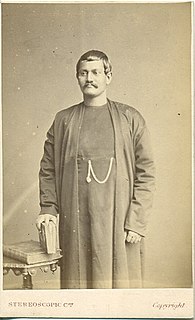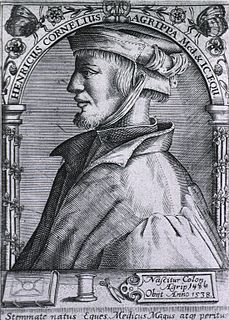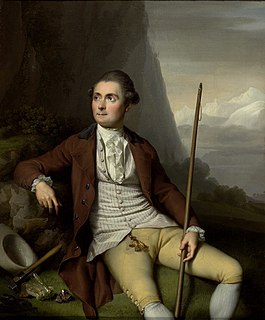A Quote by Immanuel Kant
In the natural state no concept of God can arise, and the false one which one makes for himself is harmful. Hence the theory of natural religion can be true only where there is no science; therefore it cannot bind all men together.
Related Quotes
Creationists argue that natural selection is only a negative process, and therefore cannot create anything. Chopra argues that skepticism is only a negative process, and therefore does not lead to knowledge. Both are wrong for the same reasons. They ignore the generation of diversity and new ideas upon which natural selection and skepticism acts. Weeding out the unfit is critical to both - natural selection allows evolution to proceed, and skepticism allows science to advance.
We are not to renounce our senses and experience, nor (that which is the undoubted Word of God) our natural Reason. For they are the talents which he hath put into our hands to negotiate, till the coming again of our blessed savior, and therefore not to be folded up in the napkin of an implicate faith, but employed in the purchase of justice, peace, and true religion. For though there be many things in God's Word above Reason--that is to say, which cannot by natural reason be either demonstrated or confuted--yet there is nothing contrary to it.
The true object of religion is to bind mankind together, and to bind them all to God. If we see that in the name of religion, men, instead of promoting peace on earth and good-will among men, are trying to show their antagonism and animosity towards each other, then certainly we must stand forward with our voice of protest, and say that religion is defeating its own legitimate object.
Silence and stillness are not states and therefore cannot be produced or created. Silence is the non-state in which all states arise and subside. Silence, stillness and awareness are not states and can never be perceived in their totality as objects. Silence is itself the eternal witness without form or attributes. As you rest more profoundly as the witness, all objects take on their natural functionality, and awareness becomes free of the mind's compulsive contractions and identifications. It returns to its natural non-state of Presence.
If a man of good natural disposition acquires Intelligence [as a whole], then he excels in conduct, and the disposition which previously only resembled Virtue, will now be Virtue in the true sense. Hence just as with the faculty of forming opinions [the calculative faculty] there are two qualities, Cleverness and Prudence, so also in the moral part of the soul there are two qualities, natural virtue and true Virtue; and true Virtue cannot exist without Prudence.
It is one thing to say that science is only equipped to test for natural causes and cannot speak to any others. It is quite another to insist that science proves that no other causes could possibly exist. . . . There would be no experimental model for testing the statement: 'No supernatural cause for any natural phenomenon is possible.' It is therefore a philosophical presupposition and not a scientific finding.
How glorious, then, is the prospect, the reverse of all the past, which is now opening upon us, and upon the world. Government, we may now expect to see, not only in theory and in books but in actual practice, calculated for the general good, and taking no more upon it than the general good requires, leaving all men the enjoyment of as many of their natural rights as possible, and no more interfering with matters of religion, with men's notions concerning God, and a future state, than with philosophy, or medicine.
I cannot then believe in this concept of an anthropomorphic God who has the powers of interfering with these natural laws. As I said before, the most beautiful and most profound religious emotion that we can experience is the sensation of the mystical. And this mysticality is the power of all true science.
Natural Magick is taken to be nothing else, but the chief power of all the natural Sciences; which therefore they call the top and perfection of Natural Philosophy, and which is indeed the active part of the same; which by the assistance of natural forces and faculties, through their mutual & opportune application, performs those things that are above Human Reason.
The theory of natural selection is the centerpiece of The Origin of Species and of evolutionary theory. It is this theory that accounts for the adaptations of organisms, those innumerable features that so wonderfully equip them for survival and reproduction; it is this theory that accounts for the divergence of species from common ancestors and thus for the endless diversity of life. Natural selection is a simple concept, but it is perhaps the most important idea in biology.
The theory of the earth is the science which describes and explains changes that the terrestrial globe has undergone from its beginning until today, and which allows the prediction of those it shall undergo in the future. The only way to understand these changes and their causes is to study the present-day state of the globe in order to gradually reconstruct its earlier stages, and to develop probable hypotheses on its future state. Therefore, the present state of the earth is the only solid base on which the theory can rely.
The laws of thought are natural laws with which we have no power to interfere, and which are of course not to be in any way confused with the artificial laws of a country, which are invented by men and can be altered by them. Every science is occupied in detecting and describing the natural laws which are inflexibly observed by the objects treated in the Science.
On the theory of natural selection we can clearly understand the full meaning of that old canon in natural history, “Natura non facit saltum.” This canon, if we look only to the present inhabitants of the world, is not strictly correct, but if we include all those of past times, it must by my theory be strictly true.
And so it is true in this sense that there is essentially but one religion, the religion of the living God. For to live in the conscious realisation of the fact that God lives in us, is indeed the life of our life, and that in ourselves we have no independent life, and hence no power, is the one great fact of all true religion, even as it is the one great fact of human life. Religion, therefore, at its purest, and life at its truest, are essentially and necessarily one and the same.







































